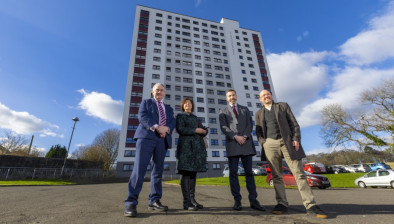Warmworks Scotland acquires Connected Response
Warmworks Scotland LLP has today announced the acquisition of Connected Response Ltd in a deal that it said will help thousands of households that are in or are at risk of fuel poverty to stay warm in their homes through innovative heating solutions, helping cut fuel usage and energy bills.

Ross Armstrong, Warmworks Scotland MD, and Kenny Cameron, Connected Response MD
Warmworks was set up in 2015 as a joint venture between Energy Saving Trust, Changeworks and Everwarm. Following the organisation’s successful delivery of the Scottish Government’s fuel poverty scheme, Warmer Homes Scotland - which has seen Warmworks support almost 25,000 households across Scotland to heat their home at a more affordable cost - the three partners are investing in the acquisition of Connected Response Ltd as part of Warmworks’ ongoing commitment to supporting a just transition to net zero, and widening access to innovative technologies for homes that are in or at risk of fuel poverty.
Formed in 2018, Connected Response has established itself as a values-driven organisation that has provided solutions for electric heating households across the UK who have found it difficult to heat their home effectively or affordably throughout the day.
The acquisition will offer Connected Response the support they need to harness the significant potential for their product and for their business to grow and diversify. By uniting with Warmworks, they will have access to the support and wider market reach that will help them facilitate that growth and increase the number of homes that can be helped with their innovative technology.
Ross Armstrong, Warmworks Scotland managing director, said: “This acquisition represents an excellent opportunity for Warmworks to strengthen the support we can provide to households in or at risk of fuel poverty with innovative heating solutions, offering more control over how their homes are heated, and creating important potential savings on their fuel usage and energy bills.
“The goals of Warmworks and Connected Response go hand-in-hand: namely, to support people at risk of fuel poverty to keep their homes warm and to save money on their energy bills. This acquisition is therefore a natural fit and an excellent opportunity for our two organisations to come together to achieve these mutual ambitions.
“The dual challenges of tackling fuel poverty and providing decarbonised heating as we move towards Net Zero will require new technologies, new approaches and new solutions. The transition to net zero must also be a just transition – meaning homes that are in or at risk of fuel poverty should have equal access to the technologies and innovations that will be a key part of the journey, as they have the most to gain from living in more energy efficient and lower carbon homes. The Connected Response system is a technology that has the potential to be an important element in providing heating solutions to these homes, and this acquisition is an opportunity to scale up the company’s already established work to reach more homes across the country with their innovative system.
“This is also a further step into the social housing market for Warmworks, and is an opportunity for the innovative retrofit storage heating technology delivered by Connected Response to support Warmworks in providing a diverse range of heating solutions to homes and landlords in this sector.
“We are thrilled to be making this acquisition and look forward to working together to bring new technologies and techniques into the homes across the country of those who stand to gain the most from a warmer, more energy-efficient property.”
Kenny Cameron, Connected Response managing director, said: “It’s an exciting time to become part of Warmworks. Our technology has evolved over many years, with the main focus being on social housing.
“We will soon begin our first major project to support owner occupiers and private renters, and are confident that joining the Warmworks team will help us extend these benefits to many more of these households.
“Our objective remains the same - to enable households with existing electric storage heating and hot water systems to enjoy a better heating experience and completely eliminate the need for expensive supplementary heating at the most carbon intensive times.”









